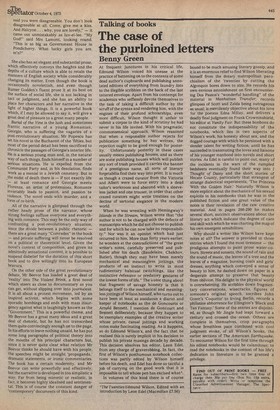Talking of books
The case of the pprloined letters
Benny Green
At frequent junctures in his critical life, Edmund Wilson voiced his unease at the practice of battening on to the contents of some dead author's cupboards and publishing annotated editions of everything from laundry lists to the illegible scribbles on the back of the last tattered envelope. Apart from his contempt for academics who selflessly devote themselves to the task of taking a difficult author by the scruff of the syntax and rendering him, with the engines of their profund scholarships, even more difficult, Wilson thought it unfair to submit a corpse to the kind of scrutiny he had never in his life invited. With his pragmatic, commonsensical approach, Wilson reasoned that when a responsible author rejects for publication something he has written, the rejection ought to be good enough for poster ity. Unfortunately posterity in these cases usually means publishing houses, and as there are some publishing houses which will publish any sort of trash provided it carries the banner of a prestigious name, all sorts of literary forgetabilia find their way into print. It is much as though a crazed curator from the Victoria and Albert were to force entry into a dead tailor's workroom and abscond with a sleeveless jacket and one trouser, in order that other crazed curators might write treatises on the decline of sartorial elegance in the modern world.
When he was wrestling with Hemingway's Islands in the Stream, Wilson wrote that "the author is not to be charged with the defects of manuscripts which he did not choose to publish and for which he can now take no responsibility." Nor was it an opinion which had just occurred to him. More than forty years earlier, he wonders at the contradictions of "the great writer's notes, carefully preserved and published after his death (Baudelaire, Chekhov, Butler), though they may have been merely mechanical and meaningless jottings, the products of an instinct to write in most rudimentary habitual twitchings, like the instinctive defensive or predatory gestures of the lowest forms of life." The it onic thing about that fragment of savage honesty is that it belongs itself to the mechanical and meaningless jottings of Wilson himself, who turns out to have been at least as assiduous a diarist and keeper of notebooks as the de Goncourts or Arnbld Bennett. I mention de Goncourt and Bednett deliberately, because they happen to be exemplary examples of the creative writer whose private, casual jottings and working notes make fascinating reading. As it happens, so do Edmund Wilson's, and the fact that he realised this is surely implicit in his decision to publish his private musings decade by decade. This decision absolves his editor, Leon Edel, from any charge of graverobbing. In fact, the first of Wilson's posthumous notebook collections was partly edited by Wilson himself before his death, and Edel has done so tactful a job of carrying on the good work that it is impossible to tell whose pen has excised what*.
In volumes of this kind there is of course bound to be much amusing literary gossip, and it is an enormous relief to find Wilson liberating himself from the dreary metropolitan parochialism of the 'twenties by cutting the Algonquin bores down to size. He records his own envious astonishment on first encountering Dos Passos's "wonderful handling" of the material in Manhattan Transfer; records glimpses of Scott and Zelda being outrageous as usual; is mercilessly objective about his love for the poetess Edna Millay, and delivers a deadly final judgment on Frank Crowninshield, his editor at Vanity Fair. But these bonbons do not constitute the indispensability of the notebooks, which lies in two aspects of Wilson's work, his honesty about sex, and the dogged courage with which he persisted with a slender talent for writing fiction, until he has succeeded in transmuting the loves and liaisons of his younger manhood into novels and short stories. As Edel is careful to point out, many of the incidents in the wars of the rumpled bedsheets eventually found their way into I Thought of Daisy and the short stories of Hecate County, particularly that strangest of strange dialectical experiments, 'The Princess With the Golden Hair.' Naturally Wilson is more explicit about the mechanics of his sexual exploits in his notebooks than he was in the published fiction and one great value of the notes is their revelation of the raw creative material. And in pages 286-290 he makes several short, succinct observations about the literary act which indicate the degree of care and skill with which he was charting the map of his own emergent sensibilities.
Why should a writer like Wilson have kept notes at all? The answer is provided in those entries which I found the most tiresome — the prodigious attempts to paint prose water-colours. Streets and sunsets, the sound of rain and the sound of music, the leaves of a tree and the leaves of a magazine, burning coals and girls' dresses, anything which conveyed a sense of beauty to him, he dashed down on paper in a desperate attempt to preserve that beauty from oblivion. His delight in the physical world is overwhelming. He scribbles down fragmentary conversations, wisecracks, figures of someone's original speech, ascribes John Green's 'Coquette' to Irving Berlin, records a philistine abhorrence for Ellington's 'Black and Tan Fantasy.' Some of the entries are disjointed, as though Mr Jingle had leapt forward a century and crossed the ocean. Others are complete in themselves, crisp paragraphs whose breathless pace combined with cool judgment evoke, of all Wilson's books, the earlier sections of The American Earthquake. To encounter Wilson for the first time through his edited notebooks would be calamitous; to read the notebooks in the context of his life's dedication to literature is to be granted a privilege.


































 Previous page
Previous page